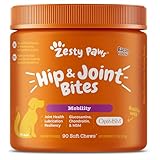When providing a wholesome and natural treat for your canine companion, few options compare to raw beef knuckle bones for dogs. These nutrient-rich bones offer numerous benefits for your dog’s dental health, mental stimulation, and overall well-being.
Raw Beef Knuckle Bones For Dogs

Raw beef knuckle bones are a nutritional powerhouse for dogs, providing essential nutrients like calcium, phosphorus, and other vital minerals crucial for maintaining strong bones and teeth.
The treat offers a good source of natural protein, which supports muscle growth and repair.
Can Dogs Eat Raw Beef Knuckle Bones?
Yes, dogs can eat raw beef knuckle bones. Beef knuckles are rich in essential nutrients like calcium, phosphorus, and beneficial fatty acids, which contribute to a stronger immune system and improved dental and bone health in canines. However, it’s crucial to approach this treatment with care.
Never offer cooked knuckle bones, as they can become brittle and prone to splintering.
Always supervise your dog while chewing, choose a size that matches your dog’s physique, and be mindful of potential risks such as splintering and bacterial contamination.

Benefits of Raw Beef Knuckle Bones For Dogs
-
Dental Health: Chewing on raw bones is a natural dental abrasive, effectively removing plaque and tartar buildup from a canine’s teeth. This promotes superior oral hygiene and significantly lowers the likelihood of dental problems such as gum disease and tooth decay.
-
Mental Stimulation: Chewing on raw beef knuckle bones provides mental stimulation and can help alleviate boredom, anxiety, and destructive behavior in dogs.
-
Exercise: Cheating on a bone can help exercise the jaw muscles and can also be a form of physical activity for your dog.
-
Nutritional Value: Raw bones contain essential nutrients like calcium and phosphorus, which are vital for maintaining healthy bones, teeth, and overall bodily functions.
-
Joint Health: The connective tissues and cartilage in raw knuckle bones for dogs offer a natural reservoir of glucosamine and chondroitin. These compounds are crucial in bolstering joint health and enhancing mobility for dogs.
-
Digestive Health: Raw bones offer a natural source of dietary fiber, promoting a healthy digestive system for dogs.
-
Stress Reduction: Chewing on a bone can be soothing and stress-relieving for dogs, especially during anxiety or change.
-
Natural Behavior: Chewing on bones is a natural behavior for canines and allowing them to do so can fulfill their instinctual need to chew.
-
Entertainment: A bone can be a source of entertainment for a dog, especially when filled with marrow or bits of meat.
Risks
-
Choking Hazard: Bones, especially if they’re small or the dog tries to swallow large pieces, can present a choking hazard.
-
Broken Teeth: Hard bones can potentially lead to broken teeth, which can be painful for the puppies and may require veterinary intervention.
-
Mouth or Gum Injuries: Bones can cause injuries to a pet’s mouth or gums. Mouth injuries can range from minor cuts to more severe injuries.
-
Digestive Obstruction: Bone fragments or sharp splinters can sometimes cause obstructions in a pup’s digestive system.
-
Bacterial Contamination: Raw meat, including bones, may harbor harmful bacteria like Salmonella or E. coli. While dogs are generally more resilient to these pathogens than humans, there is still a potential risk.
-
Nutritional Imbalance: While bones can be a good source of minerals and nutrients, they shouldn’t be the primary source of nutrition for a dog. They lack certain essential nutrients that a balanced dog food can provide.
-
Allergic Reactions: Certain dogs may have allergies to specific proteins in beef or sensitivities that can be exacerbated by consuming bones.
Related Post: Is Raw Chicken Backs Safe For Dogs?
Importance of Choosing the Right Size
Selecting an appropriate-sized knuckle bone is crucial. It should be large enough to prevent your dog from swallowing it whole but small enough for them to comfortably hold in their paws.
Always supervise your furry friend while they enjoy their bone to ensure their safety.
Safety Precautions
While raw beef knuckle bones are generally safe for dogs, some precautions must be remembered. Refrain from offering cooked bones, which can splinter and pose a choking hazard.
Discard any bone that becomes small enough to swallow.
How To Introduce?

If your furry friend is new to raw bones, it’s essential to introduce them gradually.
Start with short sessions and monitor their digestion.
Certain dogs may have heightened sensitivity to dietary adjustments. Hence, it’s wise to exercise caution.
Storage & Handling
Proper storage and handling of raw knuckle bones are essential to maintain their freshness and safety.
To prevent spoilage, store them in the freezer. Remember to wash your hands after handling them to minimize the risk of bacterial contamination.
Safe Serving Ideas
-
Freeze the knuckle bone for an extended chewing session, which is especially beneficial for teething puppies.
-
Offer the bone during supervised play to ensure safety and prevent potential accidents.
-
Incorporate raw bones into your dog’s diet on occasion for variety and added nutritional benefits.
Related Post: Can Dogs Eat Ruffles?
FAQs
Are raw beef knuckle bones safe for dogs?
Yes, when offered under supervision and in moderation, raw beef knuckle bones can be a safe and enjoyable treat for dogs.
How often should I give my dog raw beef knuckle bones?
Limiting chewing sessions to a few times per week is best to prevent overconsumption and potential digestive issues.
Can raw beef knuckle bones splinter?
Raw beef knuckle bones are less likely to splinter than cooked bones, but monitoring your dog during chewing sessions is essential to prevent accidents.
Are there any health risks associated with raw beef knuckle bones?
While raw bones offer numerous health benefits, they can pose a choking hazard or cause gastrointestinal issues if consumed in excess or if the bone is damaged.
How should I store raw beef knuckle bones?
Store raw beef knuckle bones in the refrigerator or freezer to maintain freshness and prevent bacterial growth. Discard any bones that show signs of spoilage or contamination.
Can raw beef knuckle bones replace regular dental care for my dog?
While raw beef knuckle bones can contribute to your dog’s dental health, they should not replace regular brushing and professional dental cleanings recommended by your veterinarian.
Final Thoughts: Raw Beef Knuckle Bones For Dogs
Incorporating raw beef knuckle bones into your dog’s diet can be a valuable addition to their overall wellness regimen. With their nutritional benefits, dental health advantages, and mental stimulation properties, these bones offer your furry friend a natural and enjoyable treat.
Remember to prioritize safety, choose the right size, and monitor your dog’s response for a happy, healthy, bone-chewing experience.










![Can Dogs Eat Blood? 7 Side Effects [Expert Opinion]](https://petskor.com/wp-content/uploads/2022/04/Webp.net-resizeimage-12.jpg)
